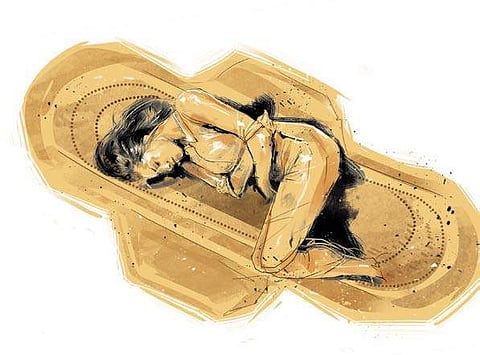

BENGALURU: The 'Cup and Cloth' campaign was launched in Bengaluru on Tuesday by 'Green the Red' group that aims to bring the government's attention to sustainable menstrual hygiene choices.
As part of the campaign, the group will send a set of sustainable menstrual products to the Prime Minister's Office. They will also call on the government to replace disposable sanitary napkins with reusable menstrual hygiene products, in its schemes and programmes.
Malini Parmar, an eco-warrior said, “Modern sanitary napkins boast of super absorbent gel. When flushed, they continue to bloat, choking our sewers. These chokes often need to be removed manually, endangering the lives of our sanitation workers.”
The campaign comes at a time when the Menstrual Hygiene Management - National Guidelines 2015 and the free distribution of sanitary pads schemes promote disposable products which are contributing to the growing waste management crisis in the country.
Dr Meenakshi Bharath, a gynaecologist and waste management expert said, “Bengaluru alone generates 90 tonnes of menstrual waste per day. Reusable menstrual products like cloth pads and menstrual cups are the right choice from a medical and an environmental perspective. A single cup may last up to 10 years and one cloth pad up to three years. They are a perfect solution for the objectives of Swachh Bharat Mission.”
As per the National Family Health Survey 2015-16 data, 57 per cent of girls and women in the age group 15-24 years have access to hygienic products to manage their menstruation.
It is estimated that a woman uses up to 10,000 sanitary pads during her reproductive age. Most sanitary pads contain a lot of plastic. Each pad may take 500-800 years to decompose. But the costs of scientifically-managed incineration are prohibitive, with bio-medical waste incineration firms charging as much as `22/kg of sanitary waste in Bengaluru.
The way ahead
Menstrual cups are silicone-based insertable devices that collect menstrual fluid
Sustainable cloth pads are made up of layers of absorbent cloth and come in various fits and types
Women who use cups do not need to restrict their activities during periods as they can go swimming, running or undertake trips
Entrepreneurs who produce green menstrual products have each donated either a menstrual cup or cloth pad to the campaign